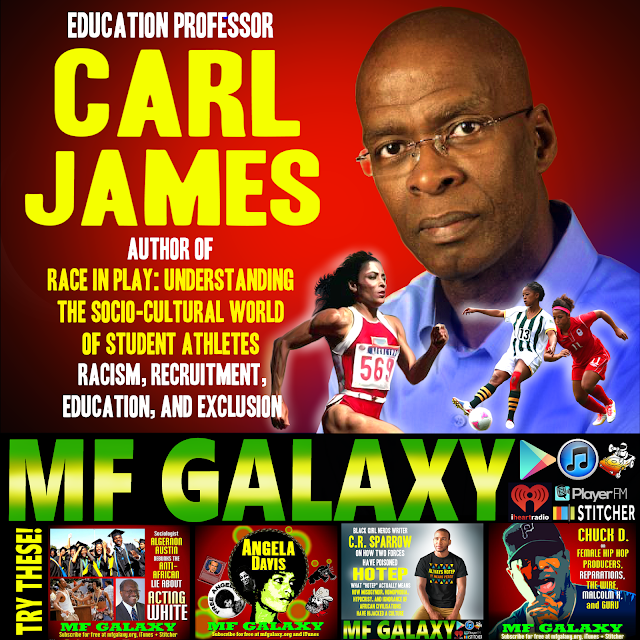CARL JAMES - RACE IN PLAY: UNDERSTANDING THE SOCIO-CULTURAL WORLD OF STUDENT ATHLETES, HOW PUBLIC SCHOOLS SHAPE CAREER AND EDUCATION PATHS BASED ON RACE
HOW RACISM AND ATHLETICS ARE TACKLING AFRICAN-CANADIAN STUDENTS
LISTEN/DOWNLOAD
Because race-based privilege, power, and exploitation are facts of planetary life, almost any society can be expected to maintain mythologies about race. That mythology includes the belief that those who belong to the racial power structure are superior to those who are excluded from that racial power system. Some of the excluded are deemed intellectually equal or potentially superior, but lacking in physical prowess and, for lack of a better term, “natural rhythm.” But then there are other people excluded by the racial power system, and inside the racial mythology, they are deemed intellectually and morally backward, but physically superior.
The late Dr. Manning Marable, a Professor of History and Political Science and formerly the Director of the Institute for Research in African-American Studies at Columbia University, discussed in a 1991 column called “Racism and the Black Athlete” how the mythology of race affected athletics. He wrote:
“For
generations, White athletes who excelled in any sport were described as
“hard-working,” “diligent,” “dedicated.” African-Americans who achieved
prominence in sports, by contrast, were known as “natural athletes” who
did not have to train rigorously for their successes. Joe DiMaggio and
Rocky Marciano were applauded by the media for their work ethic; Sonny
Liston and Willie Mays were described as “naturally-gifted athletes.”
“The
basic racist assumption beneath these statements was that Blacks were
“animals,” not human beings. Anyone knows that a horse can outrun any
person. A gorilla is more powerful than the strongest weightlifter. To
be Black was to be closer to the physical world of beasts. And of
course, Whites who displayed physical prowess were said to have achieved
these accomplishments by their mental powers.”
Marable continues:
“The
argument is not only racist, it’s illogical in the extreme. Because in
reality, success by any group in any avenue of human endeavour is
largely determined by the factors of opportunity, availability of
resources, and the levels of individual dedication.
“Why
do African-American athletes dominate the NBA, but are virtually
unrepresented in the NHL or the Professional Golfers Association? Build
5,000 ice skating rinks and public golf courses in the African-American
community and create hundreds of training programs and incentives for
Black elementary school children. Believe me, within 20 years you’ll
have some Whites writing about the “natural ability” of Blacks in golf
and ice hockey!
“Blacks
excel in athletics because opportunities are still limited in
professional and corporate circles for minorities and women. Expand job
access and affirmative action enforcement, and fewer Blacks would go
into sports.
“Racial
discrimination is still rampant in college athletics. A recently
released NCAA study indicates that the graduation rate after five years
for Black athletes is only 26.6 percent, compared to 52.2 percent for
Whites. More significantly, the vast majority of White athletes drop out
of college during their early years, while nearly as many Black
athletes leave school in their final years as in their first two. This
implies that many coaches and academic officials are more concerned with
eligibility rather than the goals of education and graduation, when it
comes to Black athletes.”
Marable concludes:
“The
NCAA study also indicated that when African-American and White athletes
have the same SAT scores, Blacks graduate from college at higher rates
than Whites. This shows that standardized tests are a poor indicator of
future academic performance, and that Blacks with lower SAT scores
shouldn’t be arbitrarily denied admission to higher education.”
Today we’re going to hear a Canadian’s take on the issue. Dr. Carl E. James is a professor in the Faculty of Education and director of the York Centre for Education and Community. He’s cross-appointed in the graduate programs in Sociology and Social Work. He researches how marginalised youth experience school, sport, and society. The Royal Society of Canada inducted James as a Fellow, one of the highest honours a Canadian scholar can achieve in the Arts, Humanities, and Sciences.
He’s the author of the book Race in Play: Understanding the Socio-Cultural World of Student Athletes. The book examines the sociology of sport, youth, racism, and education, and how institutions such as public schools shape the career paths and educational future—or failure—of athletes based on race. In December 2005 James was in Edmonton for a conference on anti-racist education. We spoke at CJSR studios about how racism and athletics are tackling African-Canadian students.
A note: During this conversation recorded in December 2005, I remarked that racism against First Nations Canadians meant that they had no paths to sharing in the bounty of multicultural settler Canada. While I meant that as a critique of the settler colonial state of which I am a part, my statement blindly ignored the many First Nations Canadians who achieve excellence and even national and international influence in innumerable fields. We make far more progress not when we simply condemn what’s unjust, but when we by recognise and replicate success.
LISTEN/DOWNLOAD
SUBSCRIBE FOR FREE ON iTUNES
SUBSCRIBE FOR FREE ON iHEARTRADIO
SUBSCRIBE FOR FREE ON PLAYER FM
SUBSCRIBE FOR FREE ON STITCHER
SUPPORT MF GALAXY ON PATREON
FOR MORE INFORMATION + LINKS



Comments